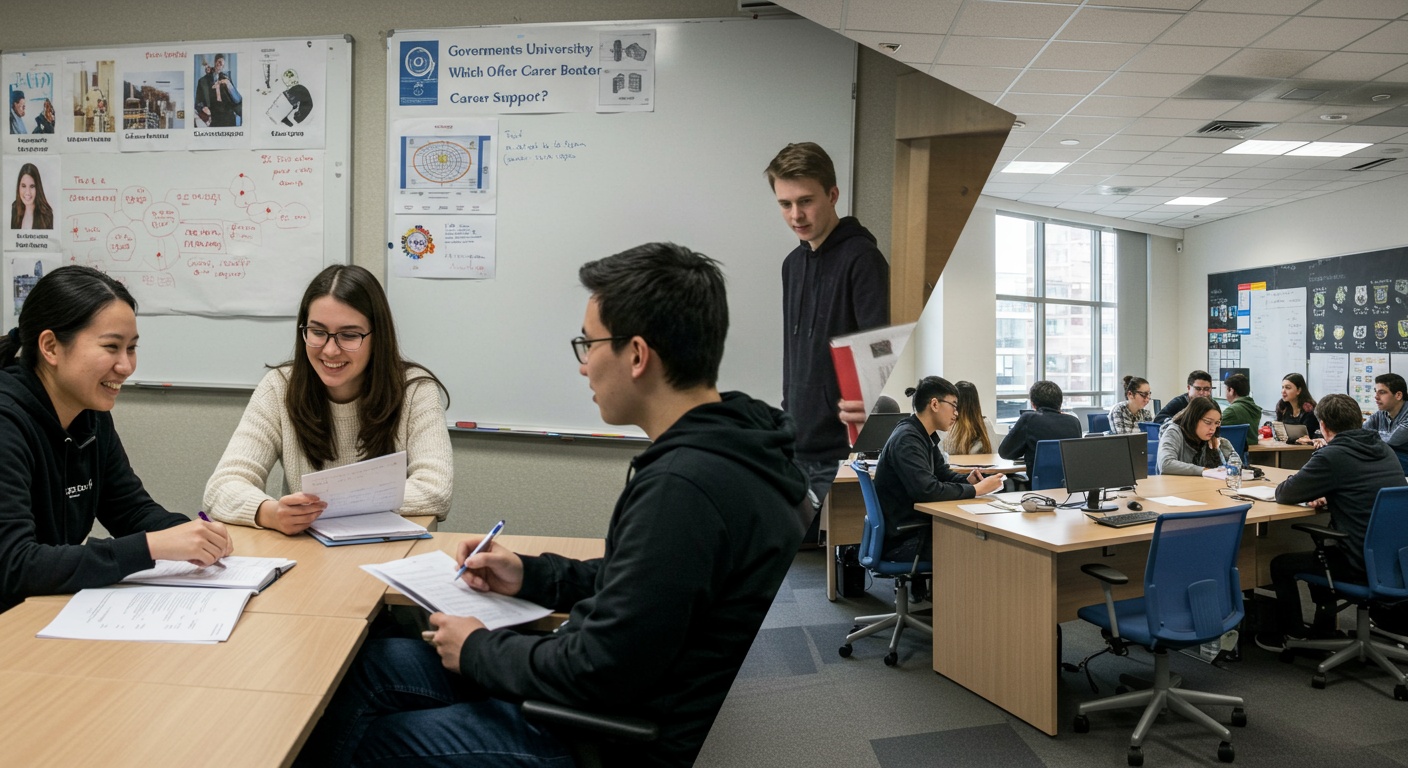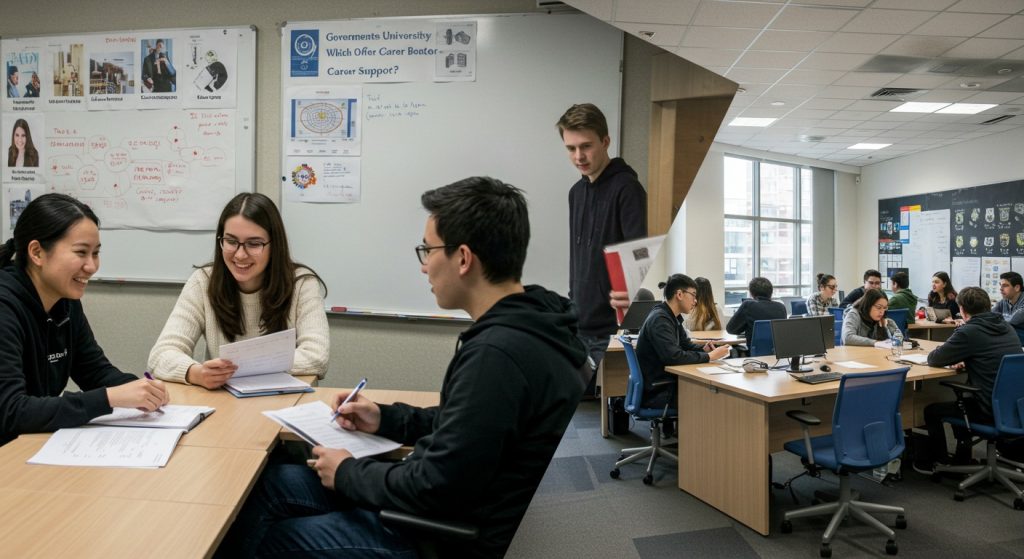Choosing a university is a pivotal life decision, especially considering the rising costs of education and the competitive job market. We often weigh factors like academic reputation and program offerings. How do government and private universities stack up when it comes to career support? Key criteria for comparison include access to employer networks, internship opportunities. Specialized career counseling services. Private universities often boast strong industry connections and personalized guidance, while government institutions may offer broader access to public sector jobs and affordability. We’ll evaluate these factors, considering recent trends like the increasing demand for tech skills and the growing importance of lifelong learning, to determine which type of institution better prepares graduates for career success.

Understanding Career Support in Higher Education
Career support in universities encompasses a range of services designed to help students transition from academic life to the professional world. These services typically include:
- Career Counseling: Individual sessions with career advisors to explore interests, skills. Career options.
- Resume and Cover Letter Workshops: Guidance on crafting effective application materials.
- Interview Preparation: Mock interviews and tips on how to perform well in job interviews.
- Internship and Job Placement Assistance: Connecting students with potential employers through job boards, career fairs. Networking events.
- Networking Opportunities: Events where students can meet and interact with industry professionals.
- Skill Development Workshops: Training on essential soft skills like communication, teamwork. Leadership.
The effectiveness of these services can vary significantly between government and private universities.
Funding and Resources: A Key Differentiator
One of the most significant differences between government and private universities is their funding model. Government universities typically rely on public funding, which can be subject to budgetary constraints and political considerations. This can impact the resources available for career support services.
Private universities, on the other hand, often have more diverse funding sources, including tuition fees, endowments. Private donations. This can allow them to invest more heavily in career development programs and facilities. For example, a private university might have a dedicated career center with state-of-the-art technology and a large team of career advisors, while a government university might have a smaller career services office with limited resources.
But, this isn’t always the case. Some government universities, particularly those with strong alumni networks or located in economically vibrant regions, can also have substantial resources for career support.
Curriculum and Industry Connections
The curriculum and industry connections of a university play a crucial role in preparing students for the job market. Private universities often emphasize practical skills and industry-relevant knowledge in their curriculum. They may also have stronger relationships with businesses and organizations, leading to more internship and job opportunities for their students.
Government universities, while often focused on theoretical knowledge and academic research, are increasingly recognizing the importance of industry connections. Many government universities are now partnering with businesses to offer internships, guest lectures. Collaborative research projects. For example, a government-funded engineering program might collaborate with a local manufacturing company to provide students with hands-on experience.
The strength of these connections can also depend on the specific program or department within the university. Some departments within government universities may have very strong ties to industry, while others may be more academically focused.
Alumni Networks: A Powerful Asset
Alumni networks are a valuable resource for career support. Alumni can provide mentorship, networking opportunities. Job leads to current students. The size and strength of a university’s alumni network can vary depending on its age, reputation. The success of its graduates.
Private universities often have strong alumni networks, as graduates tend to be more actively engaged and willing to give back to their alma mater. This can translate into more career opportunities and support for current students. For example, a private university with a large number of alumni in the finance industry might be able to offer exclusive internships and job placements to its finance students.
Government universities also have alumni networks. They may not be as actively engaged or well-organized as those of private universities. But, some government universities, particularly those with a long history and a large number of graduates, can have very influential and supportive alumni networks. The [“Government vs Private Universities”] debate often overlooks the nuanced impact of alumni contributions. For example, a state university with a strong law program might have a large number of alumni working in government and the legal profession, providing valuable career opportunities for its law students.
Career Services Staff and Expertise
The quality and expertise of the career services staff are critical to the effectiveness of career support programs. Private universities often invest in hiring experienced career advisors with industry-specific knowledge. These advisors can provide personalized guidance and support to students based on their individual career goals.
Government universities may have a smaller career services staff with a broader range of responsibilities. This can limit the amount of individual attention that students receive. But, some government universities have specialized career advisors who focus on specific fields or industries. For example, a government university with a strong nursing program might have a career advisor dedicated to helping nursing students find jobs in hospitals and clinics.
The availability of specialized career services can be a significant advantage for students pursuing careers in competitive or specialized fields.
Real-World Examples and Case Studies
To illustrate the differences in career support between government and private universities, let’s consider a few real-world examples:
- Example 1: A student at a top-tier private university pursuing a degree in computer science has access to a dedicated career advisor with experience in the tech industry. The advisor helps the student refine their resume, prepare for technical interviews. Connect with alumni working at leading tech companies. As a result, the student secures a highly competitive internship at a Silicon Valley startup.
- Example 2: A student at a state university pursuing a degree in engineering attends a career fair organized by the university’s career services office. The career fair features a wide range of employers from various industries. The student connects with a recruiter from a local manufacturing company and secures a full-time job after graduation.
- Case Study: A study comparing the career outcomes of graduates from government and private universities found that graduates from private universities were more likely to be employed in their field of study and earn higher salaries. But, the study also found that graduates from government universities were more likely to be employed in public service roles.
These examples and case studies highlight the diverse range of career support options available to students at both government and private universities. The best choice for a student will depend on their individual career goals, financial situation. Academic interests.
Making the Right Choice
When choosing between a government and private university, it’s essential to carefully consider the career support services offered by each institution. Research the career center, talk to current students and alumni. Attend career fairs to get a sense of the resources available.
Consider the following factors:
- Your Career Goals: Are you pursuing a career in a competitive or specialized field? If so, a private university with strong industry connections and specialized career advisors may be a better choice.
- Your Financial Situation: Can you afford the tuition fees at a private university? Government universities typically offer lower tuition fees, making them a more affordable option for many students.
- Your Academic Interests: Does the university offer programs and courses that align with your academic interests and career goals? Both government and private universities offer a wide range of academic programs, so it’s essential to find a university that is a good fit for your academic interests.
- Location: Is the university located in an area with strong job opportunities in your field of study? Being near industry hubs can significantly improve internship and job prospects.
Ultimately, the best university for you will depend on your individual circumstances and priorities. By carefully considering the career support services offered by each institution, you can make an informed decision that will help you achieve your career goals. The decision of [“Government vs Private Universities”] and the resulting career support is a personal and impactful one.
Conclusion
Choosing between a government or private university for career support is a deeply personal decision, with no universally “better” option. The key takeaway is to actively engage with the resources available, regardless of the institution’s classification. A proactive approach, including networking, utilizing alumni connections. Seeking out internships, is crucial. Remember that a university’s reputation, while essential, is secondary to your personal drive and dedication. Think of it as building your own career support ecosystem, leveraging the university’s offerings as key components. The Success Blueprint Highlighting the career support resources available at any institution is just the first step. Success hinges on you, the student, to actively engage and use them to your advantage. Start by identifying your career goals and then map out the university’s resources that can help you achieve them. Implementation involves attending workshops, networking events. Career counseling sessions. Success is measured by securing internships, building a strong professional network. Ultimately, landing a fulfilling job post-graduation. Motivation comes from visualizing your future success and knowing that the effort you put in now will pave the way for a brighter future. Take ownership of your career journey; your university is simply the launchpad. For those interested in law, consider researching the career support available at top law schools here.
More Articles
Leading Finance Programs in the United States: A Detailed Comparison
Top Universities Offering Master’s in Business Management in Canada
Top Universities for Law: A Global Ranking Analysis
Top Engineering Universities in Australia: Rankings and Reviews
FAQs
So, Gov vs. Private for career support… What’s the real deal?
Alright, let’s break it down. It’s not always a clear win for either side. Government universities often have larger alumni networks just by virtue of their size and long history. Private universities, especially those with strong industry connections, might offer more personalized career coaching and internship opportunities. It really depends on the specific university and program you’re looking at.
Does tuition cost affect the career support offered? Seems like pricier private schools should have better resources, right?
You’d think so, right? Higher tuition can mean more resources pumped into career services, like fancy resume workshops, mock interviews with industry professionals. Exclusive recruiting events. But, that’s not always a guarantee. Some government universities prioritize career services heavily and do a stellar job despite lower tuition. Do your research!
Okay. What kind of career support are we even talking about?
Good question! We’re talking about things like: resume and cover letter reviews, interview prep, job boards and networking events, internship placement assistance, career counseling and advising. Sometimes even mentorship programs. , anything that helps you go from student to employed professional.
Are alumni networks really that essential for landing a job?
Honestly, yes, they can be a HUGE advantage. Having connections in your field can open doors to internships, informational interviews. Even job opportunities that you wouldn’t find otherwise. Government universities often boast sprawling alumni networks, which can be a major plus.
What if I’m going into a specific field, like engineering or business? Does that change things?
Absolutely! Some private universities have rock-solid reputations and strong connections in specific industries. For instance, a private university known for its business program might offer better access to internships and recruitment opportunities in that field. Conversely, a large state university might have incredible research facilities that give engineering students a leg up.
So… How do I figure out which one is actually better for career support in my field?
Dig deep! Check out the career services websites of the universities you’re considering. Look for statistics on job placement rates, average starting salaries for graduates in your major. Lists of companies that recruit on campus. Talk to current students and alumni in your program. Attend virtual data sessions and ask specific questions about career support. Don’t just rely on general impressions!
What if I want to work for the government? Is a government university a no-brainer then?
It can definitely be an advantage! Government universities often have strong ties to government agencies and may even offer specific programs designed to prepare students for public service careers. But, don’t rule out private universities entirely. Some have excellent public policy programs and internship opportunities in government as well. Again, research is key!


